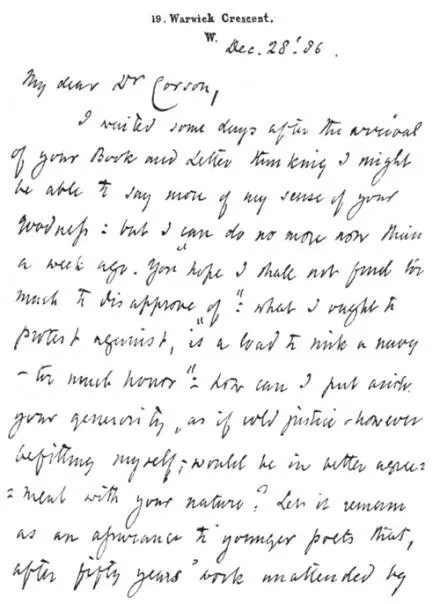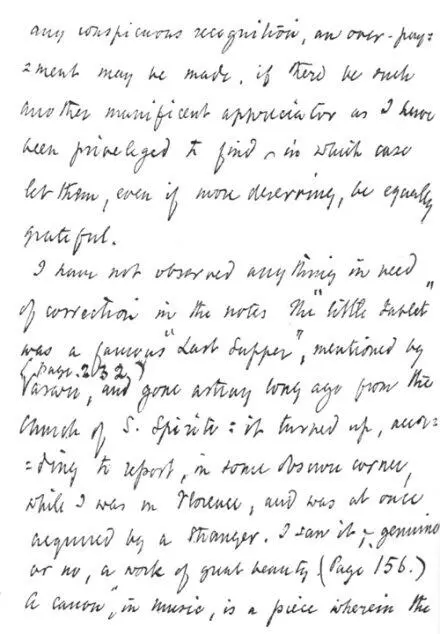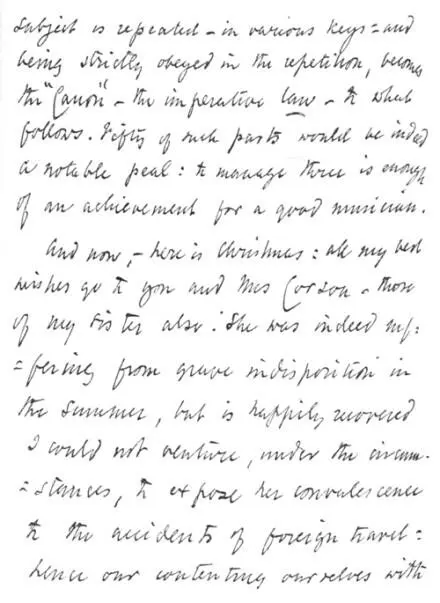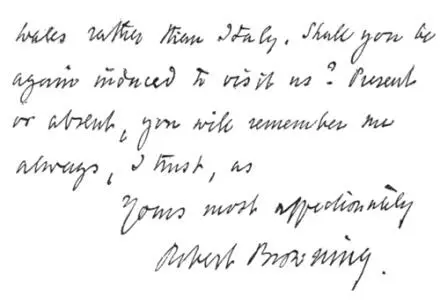Yours affectionately Ever,
Robert Browning.
In the following autumn Mr. Barrett Browning, who had not seen Venice since his infancy, joined his father, and was “simply infatuated” with the dream city. It was for his sake that Browning had wished to purchase the Manzoni Palace, “to secure for him a perfect domicile, every facility for his painting and sculpture.”
The autumn of 1886 brought to Browning a great sadness in the death of Milsand, and Miss Browning being out of health, and unequal to a continental journey, they both passed a part of the autumn at Llangollen, where Sir Theodore and Lady Martin (Helen Faucit) were their near neighbors, with whom they had tea every Sunday, and renewed one of the most delightful friendships.
On the publication of Dr. Corson’s “Introduction to the Poetry of Browning,” he sent a copy to the poet who thus replied:
19. Warwick Crescent.
W.
Dec. 28. ’86.
My dear D rCorson,
I waited some days after the arrival of your Book and Letter thinking I might be able to say more of my sense of your goodness: but I can do no more now than a week ago. You “hope I shall not find too much to disapprove of”: what I ought to protest against, is “a load to sink a navy—too much honor”: how can I put aside your generosity, as if cold justice—however befitting myself,—would be in better agreement with your nature? Let it remain as an assurance to younger poets that, after fifty years’ work unattended by any conspicuous recognition, an over-payment may be made, if there be such another munificent appreciator as I have been privileged to find—in which case let them, even if more deserving, be equally grateful.
I have not observed anything in need of correction in the notes. The “little tablet” was a famous “Last Supper,” mentioned by Varwn, (page. 232) and gone astray long ago from the Church of S. Spirito: it turned up, according to report, in some obscure corner, while I was in Florence, and was at once acquired by a stranger. I saw it,—genuine or no, a work of great beauty. (Page 156.) A “canon,” in music, is a piece wherein the subject is repeated—in various keys—and being strictly obeyed in the repetition, becomes the “Canon”—the imperative law —to what follows. Fifty of such parts would be indeed a notable peal: to manage three is enough of an achievement for a good musician.
And now,—here is Christmas: all my best wishes go to you and Mrs. Corson—those of my sister also. She was indeed suffering from grave indisposition in the summer, but is happily recovered. I could not venture, under the circumstances, to expose her convalescence to the accidents of foreign travel—hence our contenting ourselves with Wales rather than Italy. Shall you be again induced to visit us? Present or absent, you will remember me always, I trust, as
Yours most affectionately
Robert Browning.
The year of 1887 was an eventful one in that the “Parleyings” were published in the early spring; that Browning removed from Warwick Crescent to 29 DeVere Gardens; and that the marriage of his son to Miss Coddington of New York was celebrated on October 4 of that year, an event that gave the poet added happiness. To a stranger who had asked permission to call upon him Browning wrote about this time:
“... My son returns the day after to-morrow with his wife, from their honeymoon at Venice, to stay with me till to-morrow week only, when they leave for Liverpool and America—there to pass the winter. During their short stay, I am bound to consult their convenience, and they will be engaged in visiting, or being visited by friends, so as to preclude me from any chance of an hour at my own disposal. If you please—or, rather, if circumstances permit you to give me the pleasure of seeing you at twelve on Saturday morning, the first day when I shall be at liberty, I shall be happy to receive you.”




The stranger did so arrange that his visit should extend itself over the magic date of “November 5th,” and on that day he stood at the portal to DeVere Gardens house.
“I was taken up to the poet’s study,” he writes. “There had been that day a memorial meeting for Matthew Arnold, to which Browning had been, and he spoke with reminiscent sadness of Arnold’s life.
“‘I have been thinking all the way home of his hardships,’ said Mr. Browning. ‘He once told me, when I asked why he had not recently written any poetry, that he could not afford to, but that when he had saved enough, he intended to give up all other work, and devote himself to poetry. I wonder if he has turned to it now?’ Browning added musingly.”
One interesting incident related by this caller is that, having just been reading and being greatly impressed by Mr. Nettleship’s analysis and interpretation of “Childe Roland,” he asked the author if he accepted it. “Oh, no,” replied Mr. Browning; “not at all. Understand, I don’t repudiate it, either; I only mean that I was conscious of no allegorical intention in writing it. ’Twas like this; one year in Florence I had been rather lazy; I resolved that I would write something every day. Well, the first day I wrote about some roses, suggested by a magnificent basket that some one had sent my wife. The next day ‘Childe Roland’ came upon me as a kind of dream. I had to write it, then and there, and I finished it the same day, I believe. But it was simply that I had to do it. I did not know then what I meant beyond that, and I’m sure I don’t know now. But I am very fond of it.”
This interesting confession emboldened the visitor to ask if the poet considered ‘James Lee’s wife’ quite guiltless in her husband’s estrangement. “Well, I’m not sure,” replied Mr. Browning; “I was always very fond of her, but I fancy she had not much tact, and did not quite know how to treat her husband. I think she worried him a little. But if you want to know any more,” he continued, with a twinkle in his eye, “you had better ask the Browning Society,—you have heard of it, perhaps?”
When Robert Barrett Browning purchased the Palazzo Rezzonico, the acquirement was a delight to his father, not unmixed with a trace of consternation, for it is one of the grandest and most imposing palaces in Italy. Up to 1758 it was occupied by Cardinal Rezzonico himself, when, at that date, he became Pope under the title of Clement XIII. This palace, built in the seventeenth and eighteenth centuries, commands an unparalleled situation on the Grand Canal, and the majestic structure of white marble, with its rich carvings, the baroque ornaments of its key-stones, its classic cornices and tripartite loggias, its columns and grand architectural lines, is remarked, even in Venice, the city of palaces, for its sumptuous magnificence. As Mr. Browning had before remarked to Mrs. Bronson, “Pen” was infatuated with Venice. It is equally true that much of the infatuation of the ethereal city for subsequent visitors was due in no small measure to the beautiful and reverent manner in which Robert Barrett Browning made this palace a very Valhalla of the wedded poets, Robert and Elizabeth Barrett Browning. Here the son gathered every exquisite treasure associated with his mother, and when, three years later, his father breathed his last within this noble palace, the younger Browning added to the associations of his mother those, also, of his father’s books, art, and intimate possessions. With his characteristic courtesy and generous consideration Mr. Barrett Browning permitted visitors, for many years, through his entire ownership of the palace, to visit and enjoy the significant collections, treasures which his taste and his love had there gathered.
Читать дальше
















